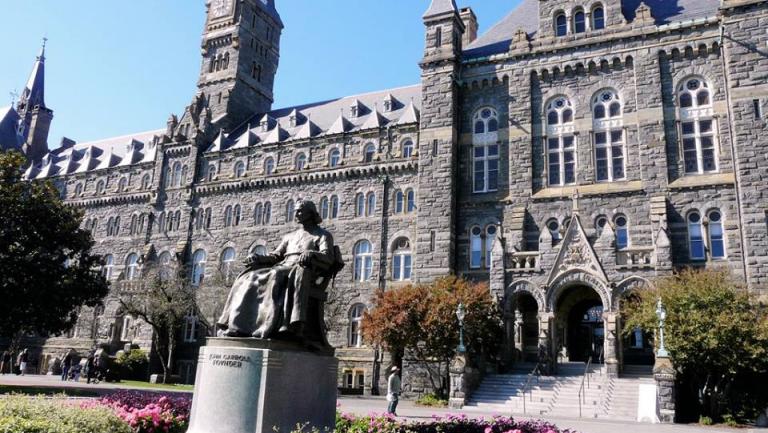
Georgetown University Law Center is pleased to offer Leadership and Advocacy for Women in Africa (LAWA) Fellowship Program. These fellowships are awarded to Africans students to study LLM programme for the academic year 2017-2018.
The Leadership and Advocacy for Women in Africa (LAWA) Fellowship Program was founded in 1993 at the Georgetown University Law Center in Washington, DC, in order to train women’s human rights lawyers from Africa who are committed to returning home to their countries to advance the status of women and girls throughout their careers.
The goals of the U.S. and LAWA Fellowships are multifaceted to advance the rights and well-being of women and their families through legal advocacy, research, outreach, and education; to allow public interest organizations to benefit from skilled legal assistance.
Applicants must have strong English language skills both written and oral. Language problems have been the primary barrier to success for LAWA Fellows.
Course Level: Fellowships are available for pursuing master (LLM) program.
Study Subject: Fellowships are provided in the field of law.
Scholarship Award: The LAWA Fellowship provides the tuition for the Foundations of American Law and Legal Education Course (a U.S. $2,200 benefit) and for the LL.M. degree (a U.S. $46,865 benefit) at the Georgetown University Law Center, as well as professional development training. Candidates who are admitted to the LAWA Program must be prepared to cover the costs of all additional expenses (such as their visas, travel, housing, utilities, food, clothing, health insurance, books, etc.), and must be able to demonstrate to the U.S. Embassy for visa purposes that they have the funds available to cover those expenses (approximately $28,000)
Scholarship can be taken in the USA
Eligibility:
- Candidates who are awarded a LAWA Fellowship must be prepared to cover the costs of all additional expenses (such as visas, travel, housing, utilities, food, clothing, health insurance, books, fees, etc.). Candidates must be able to demonstrate to the U.S. Embassy for visa purposes that they have the full amount of funds available to cover these expenses at the time of their visa application. This totals over U.S. $25,845. For the summer internship portion, students need to show $2,232 per month, for the 2 to 3 month internship period. These costs are significantly less if you can affirm that you are staying with family in the Washington, DC area. Candidates are encouraged to apply for individual funding, or seek support from their employers. The LAWA Program does not have the capacity to assist with these efforts.
- Applicant must be a women’s human rights lawyer from Africa in order to be considered. The must hold an LL.B. or another law degree. Preference is given to those who are currently living and working in Africa, and do not already have a Masters’ Degree.
- The strongest applicants tend to be about five to ten years out of law school. Others with less of more experience may be considered and accepted into the LAWA Program. Candidates with no work experience and are applying directly from an LL.B. or another law school will not be considered.
- Men who are committed to women’s rights are strongly encouraged to apply.
- As a requirement of participation in the LAWA Program, all applicants must commit to returning home to their own countries upon completion of the Fellowship and to use their best professional efforts to advance women’s human rights in their countries throughout their careers.
- The LAWA Program requires candidates to become proficient in using computers for drafting papers and conducting research. Candidates are strongly encouraged to learn basic computer skills before arrival in order to make this transition easier. At the very minimum, candidates should work to improve their typing speed before starting the program.
- Candidates must be prepared to enter a very demanding course of study. LAWA Fellows take four required courses and several more elective courses over the course of the two semesters. Fellows are required to produce a Masters’ Thesis totaling no fewer than 40 pages, including several drafts of intense research, writing, and editing. Successful completion of the program requires intense commitment, focus, and very hard work.
Nationality: Women applicants from any African countries (Algeria, Angola, Benin, Botswana, Burkina Faso, Burundi, Cameroon, Cape Verde, Central African Republic, Chad, Comoros, Côte d’Ivoire, Djibouti, Egypt, Equatorial Guinea, Eritrea, Ethiopia, Gabon, Gambia, Ghana, Guinea, Guinea-Bissau, Kenya, Lesotho, Liberia, Libya, Madagascar, Malawi, Mali, Mauritania, Mauritius, Morocco, Mozambique, Namibia, Niger, Nigeria, Republic of the Congo, Rwanda, Sao Tome and Principe, Senegal, Seychelles, Sierra Leone, Somalia, South Africa, Sudan, Swaziland, Tanzania, Togo, Tunisia, Uganda, Western Sahara, Zambia and Zimbabwe) are eligible to apply for this fellowship programme.
College Admission Requirement
Entrance Requirement: Applicants must hold an LL.B. or another law degree.
English Language Requirement: Applicants whose first language is not English are usually required to provide evidence of proficiency in English at the higher level required by the University.
How to Apply: Applicants should send completed application via email. There is no need to apply separately to Georgetown. Please submit all of the Following to apply
- Complete the Application Form, including all three essay questions.
- Current Resume or CV
- Two Letters of Recommendation (letters of reference) from persons who are well acquainted with you, your commitment to advancing women’s human rights in your country, your legal abilities, and your work. At least one reference should be a person who is willing to assist you in a professional manner upon your return to your country. Recommendations should make specific reference to your skills and knowledge. Please do not submit references that just attest to your good character.
- Official Law School Transcript
Application Deadline: The application deadline is January 13, 2017.

Leave a Reply